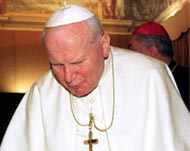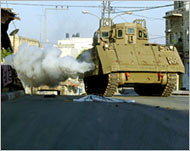Vatican, Israel in terror spat
Jewish leaders have said they are worried by an escalating Vatican-Israeli spat over papal pronouncements on terrorism and urged both sides to tone down the rhetoric to avoid any lasting damage to relations.

Rome’s chief rabbi, Riccardo Di Segni, said on Friday that the dispute was “only damaging for both parties” and that he hoped it ended quickly, particularly before Pope Benedict XVI visits a synagogue in Cologne, Germany, next month.
“As a religious leader, I am really worried about the escalating level of this debate and that we stop as soon as possible,” he said.
The Vatican and Israel tried on Friday to put the dispute behind them, refusing to comment further after a week of tit-for-tat pronouncements that culminated on Thursday with a harshly worded Vatican statement telling Israel to stop trying to give the pope lessons on what to say.
The dispute erupted on Monday, when Israel summoned the Vatican envoy to complain that Benedict had “deliberately failed” to include a “suicide bombing” in the Israeli city of Netanya when he listed countries recently hit by terrorist attacks.
Former pope refrained
The Vatican press office said Benedict’s condemnation during his Sunday prayer covered all terrorist attacks in recent days.
 |
|
Israel says it quietly protested |
But the following day, an Israeli Foreign Ministry official, Nimrod Barkan, was quoted as telling the Jerusalem Post that Israel had for years quietly protested that Pope John Paul II had refrained from condemning attacks in Israel and was now going public with its protest in hopes that the new pope would change the policy.
“Since they never paid a price for the lack of a condemnation, they continued to do it. But if they understand we won’t let this pass quietly, I assume they will change their ways,” Barkan was quoted as saying.
He said he wasn’t concerned that public protest would damage relations with Benedict, saying, “What could be worse than implying that it is OK to kill Jews?”
‘Groundless’ accusations
Vatican spokesman Joaquin Navarro-Valls made an unusually harsh rebuttal on Thursday, issuing a two-page list of the times John Paul condemned attacks against Jews and calling Barkan’s accusations “groundless” and invented.
|
“The attacks against Israel sometimes were followed by immediate Israeli reactions not always compatible with the rules of international law” Vatican statement |
He said the Vatican couldn’t condemn every attack against Israel because often Israel would respond in ways that violated international law.
“It would consequently have been impossible to condemn the former and remain silent on the latter,” he said in a statement.
“It’s not always possible to immediately follow every attack against Israel with a public statement of condemnation, and for various reasons, among them the fact that the attacks against Israel sometimes were followed by immediate Israeli reactions not always compatible with the rules of international law,” a statement from the Vatican press office said on Thursday night.
Overreaction
Rabbi David Rosen, who heads the interreligious affairs department of the American Jewish Congress, said that each side overreacted and that he expected the incident would blow over.
 |
|
The Vatican says it was not always |
He suggested one possible reason for the high degree of the rhetoric might be because both sides were feeling frustrated over stalled talks on formalising the church’s tax exempt status in Israel, as called for by a 1994 agreement.
But he said Navarro-Valls had crossed a line by suggesting there was an equivalency between a country’s need to defend its citizens and acts of terrorism.
He said that made him wonder whether the Vatican did intend in its remarks to separate the Israeli-Palestinian conflict from attacks elsewhere.
“From its perspective (the Vatican) has to pick its battles,” he said.
“If it is perceived in the Arab-Muslim world as being too sympathetic to Israel, it can undermine its ability to pursue and promote what it sees as wider and more important interests in relation to the Arab-Muslim world,” he said.
Synagogue visit
Seymour Reich, who has been involved in Jewish-Vatican negotiations in the past, said both sides had overreacted and urged them to “take a deep breath and look at the bigger picture regarding Israel-Vatican relations and the Vatican’s world Jewry relations”.
Reich, a former chairman of the New York-based International Jewish Committee for Inter-religious Consultations, an umbrella group of major Jewish organisations, said he thought that the issue would die down and that the pope’s Cologne synagogue visit would go ahead.
He said he also didn’t think the spat would affect celebrations this fall commemorating the 40th anniversary of the Vatican’s “Nostra Aetate” declaration that revolutionised relations with Jews.
In the document, the Vatican rejected anti-Semitism and the notion that Jews were collectively responsible for the death of Christ.